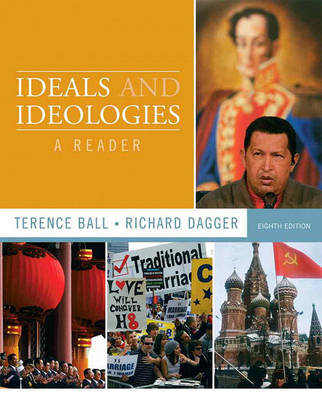Table of Contents
* Selections new to the ninth edition.
PART I. IDEOLOGY AND DEMOCRACY
Chapter 1. Ideology and Ideologies
Reading 1.1. Terrell Carver, â Ideology: The Career of a Conceptâ
Chapter 2. The Democratic Ideal
Reading 2.1. Euripides, â Democracy and Despotismâ
Reading 2.2. Pericles, â Funeral Orationâ
Reading 2.3. Aristotle, â Democratic Judgment and the â Middlingâ Constitutionâ
Reading 2.4. Niccol� Machiavelli, â Whatâ s Wrong with Princely Rule?â
Reading 2.5. John Adams, â What Is a Republic?â
Reading 2.6. â Bill of Rights of the United Statesâ
Reading 2.7. Alexis de Tocqueville, Democracy and Equalityâ
Reading 2.8. John Stuart Mill, â Democratic Participation and Political Educationâ
PART II. THE DEVELOPMENT OF POLITICAL IDEOLOGIES
Chapter 3. Liberalism
Reading 3.1. Thomas Hobbes, â The State of Nature and the Basis of Obligationâ
Reading 3.2. John Locke, â Toleration and Governmentâ
Reading 3.3. Thomas Paine, â Government, Rights, and the Bonds Between Generationsâ
Reading 3.4. â Declaration of Independence of the United Statesâ
Reading 3.5. â Declaration of the Rights of Man and of Citizensâ
Reading 3.6. Adam Smith, â Private Profit, Public Goodâ
Reading 3.7. Immanuel Kant, â Freedom and Enlightenmentâ
Reading 3.8. John Stuart Mill, â Liberty and Individualityâ
Reading 3.9. William Graham Sumner, â According to the Fitness of Thingsâ
Reading 3.10. T. H. Green, â Liberalism and Positive Freedomâ
*Reading 3.11. Franklin D. Roosevelt, â New Deal Liberalism: A Defenseâ
Reading 3.12. Murray Rothbard, â Libertarian Anarchismâ
*Reading 3.13. Terence Ball, â A Libertarian Utopiaâ
Chapter 4. Conservatism
Reading 4.1. Edmund Burke, â Society, Reverence, and the â True Natural Aristocracyâ â
Reading 4.2. Joseph de Maistre, â Conservatism as Reactionâ
Reading 4.3. Michael Oakeshott, â On Being Conservativeâ
*Reading 4.4. Russell Kirk, â Ten Conservative Principlesâ
Reading 4.5. Robert H. Bork, â Modern Liberalism and Cultural Declineâ
Reading 4.6. Irving Kristol, â The Neoconservative Persuasionâ
Reading 4.7. James Dobson, â Standing Strong in a Confused Cultureâ
Reading 4.8. W. James Antle III, â The Conservative Crack-upâ
Chapter 5. Socialism and Communism: More to Marx
Reading 5.1. Thomas More, â Utopiaâ
Reading 5.2. Robert Owen, â Address to the Inhabitants of New Lanarkâ
Reading 5.3. Karl Marx and Friedrich Engels, â The Communist Manifestoâ
Reading 5.4. Karl Marx, â On the Materialist Conception of Historyâ
Chapter 6. Socialism and Communism: After Marx
Reading 6.1. Eduard Bernstein, â Evolutionary Socialismâ
Reading 6.2. V. I. Lenin, â Revisionism, Imperialism, and Revolutionâ
Reading 6.3. Leon Trotsky, â The Permanent Revolutionâ
Reading 6.4. Mao Zedong, â On the Peopleâ s Democratic Dictatorshipâ
Reading 6.5. Mikhail Bakunin, â Anarcho-Communism vs. Marxismâ
Reading 6.6. Emma Goldman, â Anarchism: What It Really Stands Forâ
Reading 6.7. Edward Bellamy, â Looking Backwardâ
*Reading 6.8 â Christian Socialist Movement: A Statement of Aimsâ
Reading 6.9. Michael Yates---Can the Working Class Change the World?
Chapter 7. Fascism
Reading 7.1. Joseph-Arthur de Gobineau, â Civilization and Raceâ
Reading 7.2. Benito Mussolini, â The Doctrine of Fascismâ
Reading 7.3. Alfredo Rocco, â The Political Theory of Fascismâ
Reading 7.4. Adolf Hitler, â Nation and Raceâ
PART III. POLITICAL IDEOLOGIES TODAY AND TOMORROW
Chapter 8. Liberation Ideologies and the Politics of Identity
*Reading 8.1. Martin Luther King, Jr., â Where Do We Go from Here?â
*Reading 8.2. Malcolm X, â The Ballot or the Bulletâ
Reading 8.3. Steve Biko, â Black Consciousness and the Quest for a True Humanityâ
Reading 8.4. Mary Wollstonecraft, â A Vindication of the Rights of Womenâ
Reading 8.5. Olympe de Gouges, â Declaration of the Rights of Woman and the Female Citizenâ
Reading 8.6. Sarah Grimk�, â Letters on the Equality of the Sexesâ
Reading 8.7. â Seneca Falls Declaration of Sentiments and Resolutionsâ
Reading 8.8. Marilyn Frye, â Oppressionâ
Reading 8.9. John Corvino, â Homosexuality: The Nature and Harm Argumentsâ
Reading 8.10. Taiaiake Alfred, â Indigenist Pathways to Action and Freedomâ
Reading 8.11. Gustavo Gutierrez, â Liberation Theologyâ
Reading 8.12. Peter Singer â All Animals Are Equalâ
Chapter 9. â Greenâ Politics: Ecology as Ideology
Reading 9.1. Aldo Leopold, â The Land Ethicâ
Reading 9.2. Wendell Berry, â Getting Along with Natureâ
Reading 9.3. Dave Foreman, â Putting the Earth Firstâ
Reading 9.4. Vandana Shiva, â Women in Natureâ
*Reading 9.5. James H. Cone, â Whose Earth Is It Anyway?â
Chapter 10. Radical Islamism
Reading 10.1. Sayyid Qutb, â Milestonesâ
Reading 10.2. Ayatollah Ruhollah Khomeini, â The Necessity for Islamic Governmentâ
Reading 10.3. Osama bin Laden and Others, â Jihad Against Jews and Crusadersâ
Chapter 11. Postscript: Globalization and the Future of Ideology
Reading 11.1. John Micklethwait and Adrian Wooldridge, â The Hidden Promise of Globalization: Liberty Renewedâ
Reading 11.2. Patrick Buchanan, â Globalization as Economic Treasonâ
Author Biography
Terence Ball is Professor of Political Science at Arizona State University.
Richard Dagger is Professor of Political Science at Rhodes College.








